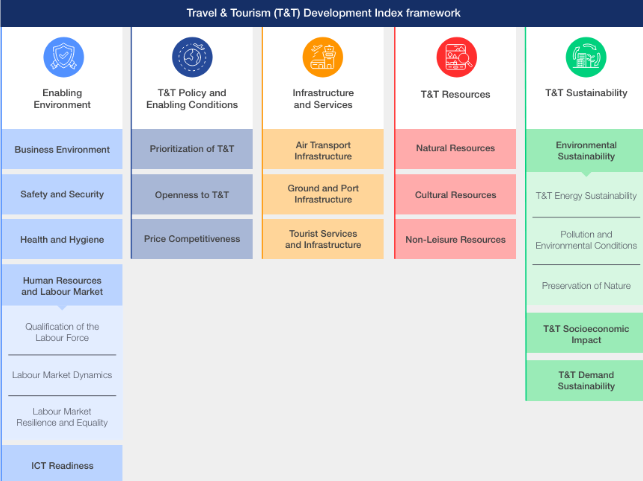News Excerpt:
India's global travel & tourism index rank up at 39th: WEF Index.
More about the news:
- India's rank on the World Economic Forum's Travel & Tourism Development Index 2024 has risen to 39th place, with global tourism activities returning to pre-pandemic levels.
- The report was compiled in collaboration with the UK-based University of Surrey.
- India is ranked highest in South Asia and among the lower-middle-income economies.
- The US, Spain, Japan, France, and Australia figure among the top five in the 2024 list.
About the report:
- The biennial index showcased the travel and tourism sectors of 119 countries across a spectrum of factors and policies.
- The index is comprised of 5 dimensions, 17 pillars, and 102 individual indicators, distributed among the different pillars. However, the five dimensions are not factored into the calculation of the index.

- The findings underscored that high-income economies typically maintain more favorable conditions for travel and tourism development.
- This was attributed to conducive business environments, dynamic labour markets, open travel policies, robust transport, and tourism infrastructure, as well as well-developed natural, cultural, and non-leisure attractions.
Status of India:
- India has climbed to the 39th position in the latest World Economic Forum's Index.
- India was 54th in 2021, but changes in index criteria limit its direct comparison with 2022 and 2023.
- India demonstrates high price competitiveness (18th) and possesses competitive air transport (26th) and ground and port infrastructure (25th) India's robust natural (6th), cultural (9th), and non-leisure (9th) resources contribute to its travel appeal, with the country being one of only three to secure a top 10 ranking across all resource pillars.
- The country's overall Travel and Tourism Development Index (TTDI) score is 2.1 percent lower than its 2019 level.
Developing countries:
- Among the 71 economies that have seen enhancements in their TTDI scores since 2019, 52 belong to low to upper-middle-income brackets.
- Only Saudi Arabia (+5.7%, moving from 50th to 41st) and the United Arab Emirates (+4.4%, climbing from 25th to 18th) from high-income economies rank among the top 10 most improved between 2019 and 2024.
- The rest are developing nations such as Uzbekistan (+7.8%, advancing from 94th to 78th), Côte d’Ivoire (+6.4%, progressing from 116th to 114th), Albania (+5.9%, moving from 78th to 66th), Tanzania (+4.5%, rising from 88th to 81st), and Indonesia (+4.5%, jumping from 36th to 22nd).
Recovery rates in international tourist arrivals
- West Asia demonstrated the highest recovery rates in international tourist arrivals, surpassing the 2019 levels by 20 percent.
- Europe, Africa, and North and South America all exhibited robust recoveries of approximately 90 percent in 2023.
- International tourist arrivals and the travel and tourism sector's contribution to global gross domestic product (GDP) are expected to return to pre-pandemic levels this year.
Leveraging the T&T sector to address global challenges:
Aside from improving readiness to handle future external global challenges including economic inequality, environmental threats linked to climate change and pollution, technological innovation, and global connectivity, the T&T sector can also play a significant role in addressing them.
To fully realize T&T’s potential in solving some of these global challenges, governments, and key stakeholders need to proactively shape the sector to become more resilient, inclusive, and sustainable for the future.
Potential key focus areas, derived from the TTDI 2024 results as well as other research, are:
- Leveraging T&T for environmental sustainability by:
– Providing greater value for nature conservation efforts
– Leading on the energy transition
– Driving responsible consumption
- Leveraging T&T for socioeconomic prosperity by:
– Investing in skilled, inclusive and resilient workforces
– Putting local communities at the centre of T&T development
– Strategically managing visitor behaviour and infrastructure development
- Leveraging T&T for global connectivity and peace by:
– Increasing travel openness
– Encouraging cultural exchange between visitors and the local community
- Leveraging T&T and technology for positive impact by:
– Adopting technology for sustainable and resilient T&T management
– Bridging the digital divide and creating opportunities
– Ensuring responsible and safe use of technology
Conclusion:
- India's ascent to the 39th position on the World Economic Forum's Travel & Tourism Development Index 2024 reflects its potential as a global tourism destination.
- Despite challenges posed by the pandemic, India's rich natural, cultural, and non-leisure resources have bolstered its appeal among travelers. However, the slight decline in its overall TTDI score compared to 2019 suggests areas for improvement, particularly in infrastructure and competitiveness.
- While India's progress is commendable, sustained efforts are needed to enhance its standing further and ensure the resilience of its tourism sector in the face of future disruptions.
|
World Economic Forum: The World Economic Forum is an organization that promotes public-private cooperation and was founded in January 1971. Headquarters: Geneva, Switzerland. Funding: It is mainly provided by collaborating companies, usually with yearly sales of more than USD 5 billion. Annual Davos Meeting: Approximately 3,000 people attend Davos to engage in 500 sessions of discussion on global issues with investors, corporate executives, political figures, economists, celebrities, and other participants. |


